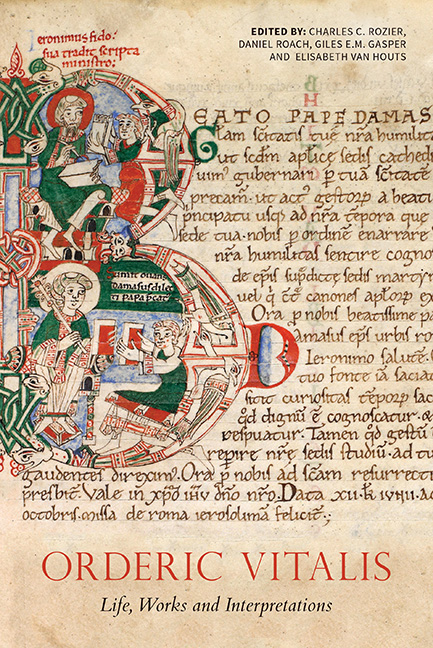Book contents
- Frontmatter
- Dedication
- Contents
- List of Illustrations
- Acknowledgements
- List of Abbreviations
- Chronology of the Lives of Odelerius and his Son Orderic Vitalis
- Composition of the Historia ecclesiastica
- Introduction: Interpreting Orderic Vitalis
- Orderic and his Father, Odelerius
- Following the Master's Lead: The Script of Orderic Vitalis and the Discovery of a New Manuscript (Rouen, BM, 540)
- Orderic Vitalis as Librarian and Cantor of Saint-Évroul
- Saint-Évroul and Southern Italy in Orderic's Historia ecclesiastica
- Orderic and English
- Inscriptions in Orderic's Historia ecclesiastica: A Writing Technique between History and Poetry
- Reading Orderic with Charters in Mind
- Orderic Vitalis and the Cult of Saints
- Orderic's Secular Rulers and Representations of Personality and Power in the Historia ecclesiastica
- Worldly Woe and Heavenly Joy: The Tone of the Historia ecclesiastica
- Orderic Vitalis, Historical Writing and a Theology of Reckoning
- Jesus Christ, a Protagonist of Anglo-Norman History? History and Theology in Orderic Vitalis's Historia ecclesiastica
- ‘Studiosi abdita investigant’: Orderic Vitalis and the Mystical Morals of History
- Meanders, Loops, and Dead Ends: Literary Form and the Common Life in Orderic's Historia ecclesiastica
- Orderic and the Tironensians
- ‘One single letter remained in excess of all his sins …’: Orderic Vitalis and Cultural Memory
- The Reception of Orderic Vitalis in the Later Middle Ages
- Appendix 1 Archaeological Investigations at the Abbey of Saint-Évroult-Notre-Dame-des-Bois
- Appendix 2 Descriptive Catalogue of Manuscripts Featuring the Hand of Orderic Vitalis
- Select Bibliography
- List of Manuscripts Cited
- General Index
‘One single letter remained in excess of all his sins …’: Orderic Vitalis and Cultural Memory
Published online by Cambridge University Press: 25 October 2017
- Frontmatter
- Dedication
- Contents
- List of Illustrations
- Acknowledgements
- List of Abbreviations
- Chronology of the Lives of Odelerius and his Son Orderic Vitalis
- Composition of the Historia ecclesiastica
- Introduction: Interpreting Orderic Vitalis
- Orderic and his Father, Odelerius
- Following the Master's Lead: The Script of Orderic Vitalis and the Discovery of a New Manuscript (Rouen, BM, 540)
- Orderic Vitalis as Librarian and Cantor of Saint-Évroul
- Saint-Évroul and Southern Italy in Orderic's Historia ecclesiastica
- Orderic and English
- Inscriptions in Orderic's Historia ecclesiastica: A Writing Technique between History and Poetry
- Reading Orderic with Charters in Mind
- Orderic Vitalis and the Cult of Saints
- Orderic's Secular Rulers and Representations of Personality and Power in the Historia ecclesiastica
- Worldly Woe and Heavenly Joy: The Tone of the Historia ecclesiastica
- Orderic Vitalis, Historical Writing and a Theology of Reckoning
- Jesus Christ, a Protagonist of Anglo-Norman History? History and Theology in Orderic Vitalis's Historia ecclesiastica
- ‘Studiosi abdita investigant’: Orderic Vitalis and the Mystical Morals of History
- Meanders, Loops, and Dead Ends: Literary Form and the Common Life in Orderic's Historia ecclesiastica
- Orderic and the Tironensians
- ‘One single letter remained in excess of all his sins …’: Orderic Vitalis and Cultural Memory
- The Reception of Orderic Vitalis in the Later Middle Ages
- Appendix 1 Archaeological Investigations at the Abbey of Saint-Évroult-Notre-Dame-des-Bois
- Appendix 2 Descriptive Catalogue of Manuscripts Featuring the Hand of Orderic Vitalis
- Select Bibliography
- List of Manuscripts Cited
- General Index
Summary
During the last two decades, the study of ‘cultural memory’ has become something of a trend in the arts and humanities – a development (or ‘turn’) which, however, has not always met with sufficient terminological and methodological transparency. More recent research conducted in the field which has come to be known as Cultural Memory Studies has addressed these insufficiencies, seeking to establish a wider interdisciplinary framework and methodological repertoire for studying the past and its preservation in different sociocultural contexts, while encouraging academic dialogue. Rather than promoting one particular approach, Cultural Memory Studies today offer a platform for scholars to exchange their interests in cultures of memory by drawing on a common vocabulary. Medieval Studies, too, have made their contribution to this development, with scholars exploring the relationships between different forms of memory in the Middle Ages, as well as the discourses on memory established by writers and thinkers of the period. On a broader scale, however, medieval historians have often been wary of applying this framework, and in particular the terminologies offered by Cultural Memory Studies. Their reservation is perhaps partially due to the fact that the terms and concepts used with great confidence by scholars of modernity when reflecting on the tradition of the past are sometimes felt to be misrepresentative of medieval thought (and thus potentially misleading). This is a perfectly legitimate concern, especially when talking about terms such as ‘media’ or ‘mediality’, which, at first glance, might seem to represent concepts alien to the Middle Ages. It is one of the aims of the present study to help overcome such barriers and argue for the more confident participation of Medieval Studies within the field of Cultural Memory Studies.
In this discussion, I will investigate how Orderic Vitalis, while writing his Historia ecclesiastica, conceived of his own role as a historian in terms of being someone actively engaged in, as well as responsible for, the preservation of the past for future generations. Of course, such a focus on Orderic's historical consciousness (Geschichtsbewusstsein) is by no means a novelty, as scholars have published extensively on this topic.
- Type
- Chapter
- Information
- Orderic Vitalis: Life, Works and Interpretations , pp. 333 - 351Publisher: Boydell & BrewerPrint publication year: 2016

